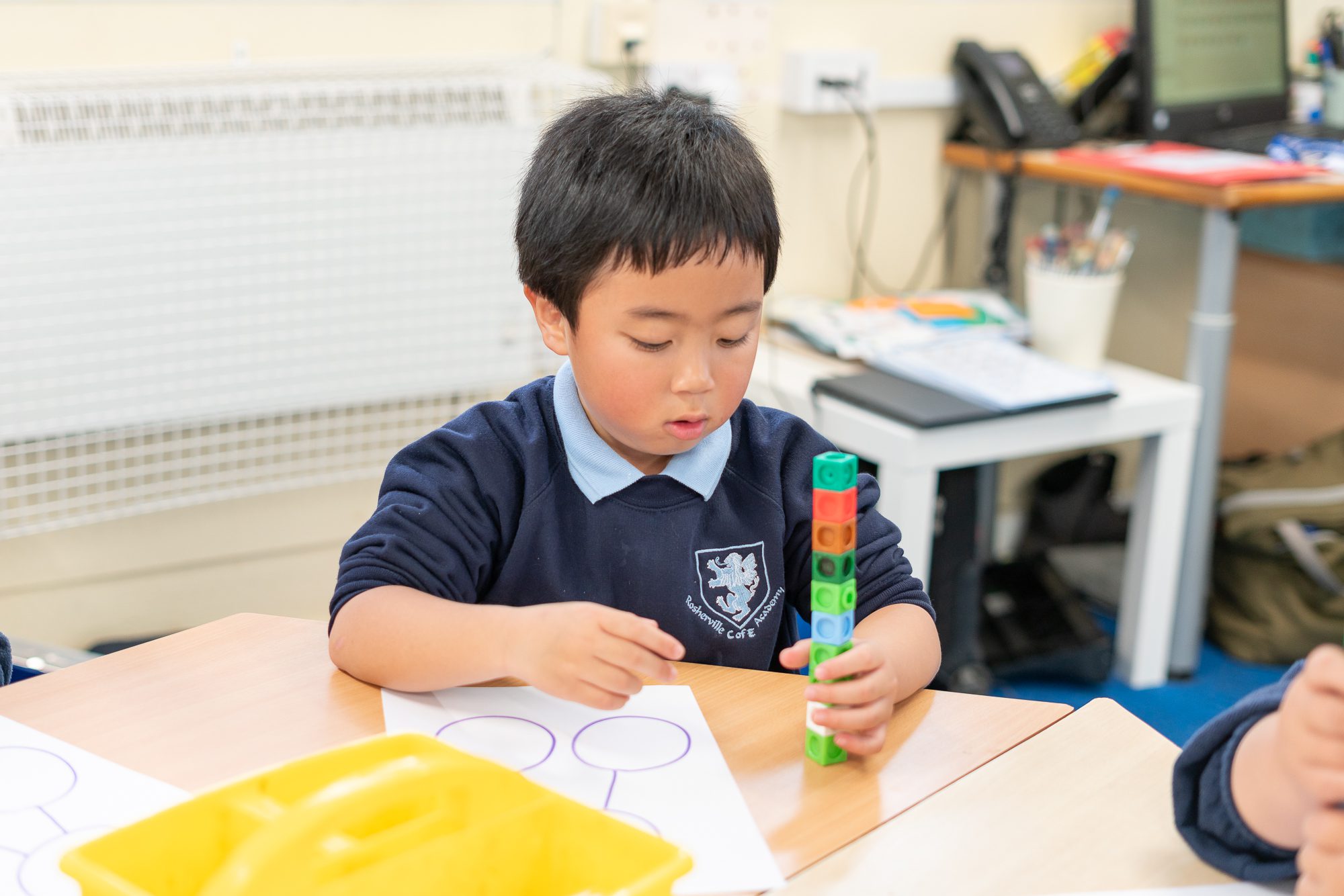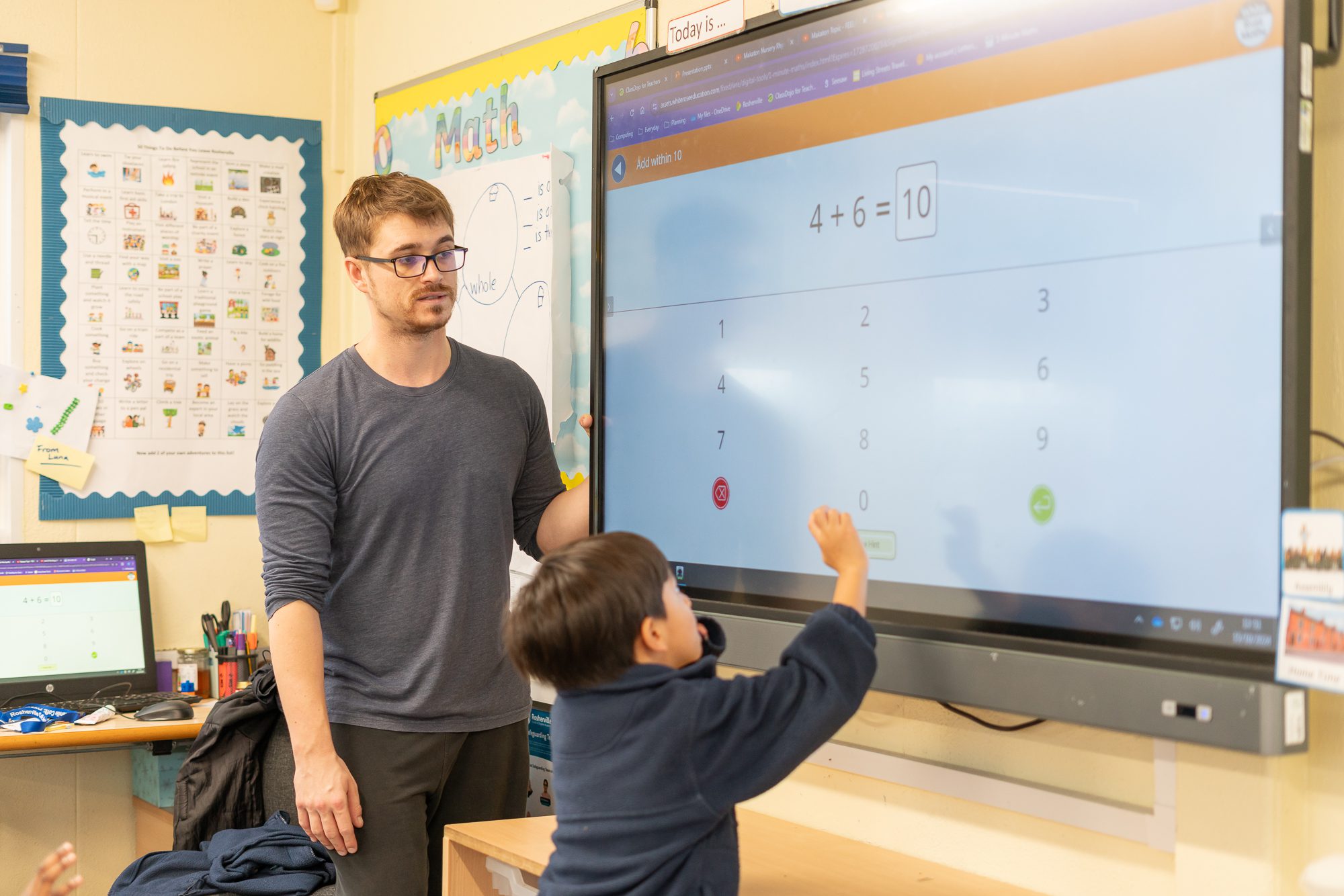Mathematics Subject Leader: Mrs S Burrha
Children develop a ‘can do’ attitude and broaden their knowledge and understanding of how Maths is used in everyday life.
The National Curriculum for mathematics aims to ensure that all pupils:
- Become fluent in the fundamentals of mathematics, including through varied and frequent practice with increasingly complex problems over time, so that pupils develop conceptual understanding and the ability to recall and apply knowledge rapidly and accurately.
- Reason mathematically by following a line of enquiry, conjecturing relationships and generalisations, and developing an argument, justification or proof using mathematical language
- can solve problems by applying their mathematics to a variety of routine and non-routine problems with increasing sophistication, including breaking down problems into a series of simpler steps and persevering in seeking solutions.
Intent
At Rosherville we aim to fully meet the requirements of the National Curriculum and ensure our children have the confidence to learn about Maths and how it is such a huge part of everyday life. We mainly follow the White Rose Maths planning which has been developed by primary practitioners to provide a curriculum plan that will support ‘Teaching for Mastery’. The Whole School Long term plan is attached below so you can see what your child is learning at any given time. There is a term plan for each year group from Year 1 to Year 6. Each term is split into twelve weeks. As part of each overview, a significant amount of time is devoted to developing key number concepts each year. This ensures students build their fluency as number sense will affect their success in other areas of mathematics. Students who are successful with numbers are much more confident mathematicians. In addition, a Calculation Policy is attached which explains how each topic is taught and how it progresses through to each year group. This should help when helping children with their homework.


Implementation
A wide range of other resources is used to ensure our children are challenged and engaged in the Maths Curriculum. Maths is taught daily and the children’s knowledge is further embedded, by undertaking reasoning and problem-solving activities. This helps to build the children’s resilience.
Children and adults can find maths difficult because it is abstract. Manipulatives play a huge role in the teaching of mathematics at Rosherville. The CPA approach helps children learn new ideas and build on their existing knowledge by introducing abstract concepts in a more familiar and tangible way.
C (Concrete) – Children are first introduced to a new concept or skill by acting it out with real objects such as cubes or counters.
P (Pictorial) – When children have had a hands-on experience they are ready to relate the problem to pictures or diagrams.
A (Abstract) – The most mysterious or abstract stage uses mathematical notation such as digits and symbols. We so easily jump to this last step but this can be very abstract without practical hands-on experiences.
We also have access to Mymaths which we use as homework and enhances what the children are learning in school.
Impact
Students build their fluency as number sense will affect their success in other areas of mathematics. Students who are successful with numbers are much more confident mathematicians. In addition, Calculation Policies are found below, which explain how each topic is taught and how it progresses through to each year group. This should help when helping children with their homework.
Times tables are an essential part of school life and children are taught how critical this is for everyday life as well as how knowledge of multiplication tables helps children to solve problems quickly and flexibly, and allows them to tackle more complex mathematics later on in school.

Mathematics in Each Stage
At EYFS, we focus on a variety of different skills to enable pupils to develop their knowledge of counting and understanding numbers, as well as exploring shapes, identifying patterns and solving addition/subtraction equations.
In Key Stage 1, we adapt from skills learnt in EYFS to identify, compare and solve problems involving numbers, lengths and volume. Working individually and in groups helps pupils to learn to think about the methods for solving problems.
In KS2, pupils will become more confident with maths by adding, subtracting, dividing and multiplying as well as performing mental calculations and solving problems using time, measure and money. By the end of year six, pupils will be able to recite their timetables up to 12 x 12.
Mathematics Progression
At Rosherville, we develop our pupil’s Mathematics understanding through essential skills; growing their depth of knowledge year on year. Through the use of ‘end of year expectations’, we are able to monitor their progress and allocate extra support and adaptations to the curriculum for pupils to maintain a strong Mathematical education.
Assessments
Times Tables are taught daily and tested weekly, through the use of Timestables Rockstars which has helped children to further learn their time’s tables in a fun way.
At Rosherville, from Year 2-Year 6, children will be given time in school to practice their times’ tables every day and will be tested once a week. They will then be awarded certificates when they achieve the following:
Bronze: 2x, 5x, 10x
Silver: 2x, 3x, 4x, 5x, 6x, 10x
Gold: 12 x 12
Platinum: Able to score at least 90/95 on the 12 x 12 facts in 3 minutes
SEND Information
Daily mathematics lessons are inclusive to pupils with special educational needs and disabilities. Where required, children’s Personalised Plans incorporate suitable objectives from the National Curriculum for Mathematics or development Matters and teachers keep these in mind when planning work. These targets may be worked upon within the lesson as well as on a 1:1 basis outside the mathematics lesson. Maths-focused intervention in school helps children with gaps in their learning and mathematical understanding. These are delivered by trained support staff and overseen by the SENCO and/or the class teacher. Within the daily mathematics lesson, teachers have a responsibility to not only provide differentiated activities to support children with SEND but also activities that provide sufficient challenge for children who are high achievers. It is the teachers’ responsibility to ensure that all children are challenged at a level appropriate to their ability.
Mathematics Extra Resources
We use the White Rose resources at Rosherville. If you would like to support your child further then please click on the link below to access their workbooks.
Further Mathematics Help
Fun Mathematics Games

